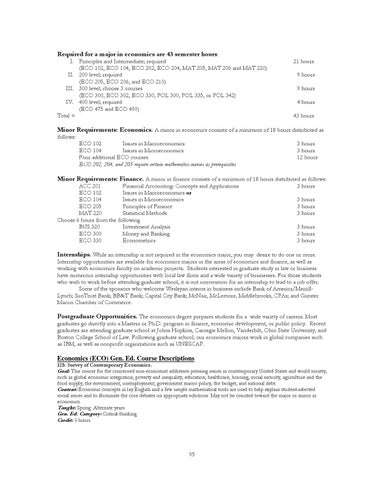Required for a major in economics are 43 semester hours: I. Principles and Intermediate; required (ECO 102, ECO 104, ECO 202, ECO 204, MAT 205, MAT 206 and MAT 220) II. 200 level; required (ECO 205, ECO 206, and ECO 210) III. 300 level; choose 3 courses (ECO 300, ECO 302, ECO 330, POL 300, POL 335, or POL 342) IV. 400 level; required (ECO 475 and ECO 490) Total =
21 hours 9 hours 9 hours 4 hours 43 hours
Minor Requirements: Economics. A minor in economics consists of a minimum of 18 hours distributed as follows: ECO 102 Issues in Macroeconomics ECO 104 Issues in Microeconomics Four additional ECO courses ECO 202, 204, and 205 require certain mathematics courses as prerequisites.
3 hours 3 hours 12 hours
Minor Requirements: Finance. A minor in finance consists of a minimum of 18 hours distributed as follows: ACC 201 Financial Accounting: Concepts and Applications ECO 102 Issues in Macroeconomics or ECO 104 Issues in Microeconomics ECO 205 Principles of Finance MAT 220 Statistical Methods Choose 6 hours from the following BUS 320 Investment Analysis ECO 300 Money and Banking ECO 330 Econometrics
3 hours 3 hours 3 hours 3 hours 3 hours 3 hours 3 hours
Internships. While an internship is not required in the economics major, you may desire to do one or more. Internship opportunities are available for economics majors in the areas of economics and finance, as well as working with economics faculty on academic projects. Students interested in graduate study in law or business have numerous internship opportunities with local law firms and a wide variety of businesses. For those students who wish to work before attending graduate school, it is not uncommon for an internship to lead to a job offer. Some of the sponsors who welcome Wesleyan interns in business include Bank of America/MerrillLynch; SunTrust Bank; BB&T Bank; Capital City Bank; McNair, McLemore, Middlebrooks, CPAs; and Greater Macon Chamber of Commerce. Postgraduate Opportunities. The economics degree prepares students for a wide variety of careers. Most graduates go directly into a Masters or Ph.D. program in finance, economic development, or public policy. Recent graduates are attending graduate school at Johns Hopkins, Carnegie Mellon, Vanderbilt, Ohio State University, and Boston College School of Law. Following graduate school, our economics majors work in global companies such as IBM, as well as nonprofit organizations such as UNESCAP.
Economics (ECO) Gen. Ed. Course Descriptions 125: Survey of Contemporary Economics. Goal: This course for the concerned non-economist addresses pressing issues in contemporary United States and world society, such as global economic integration; poverty and inequality; education; healthcare; housing; social security; agriculture and the food supply; the environment; unemployment; government macro policy, the budget, and national debt. Content: Economic concepts in lay English and a few simple mathematical tools are used to help explain student-selected social issues and to illuminate the core debates on appropriate solutions. May not be counted toward the major or minor in economics. Taught: Spring. Alternate years. Gen. Ed. Category: Critical thinking. Credit: 3 hours.
95
